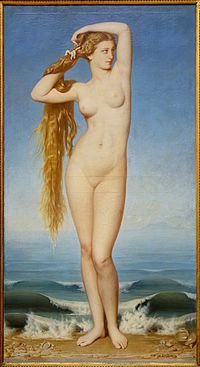



Meaning of Woman:
A
woman (irregular plural:
women) is a
female human. The term
woman is usually reserved for an adult, with the term
girl being the usual term for a female child or adolescent.
 Birth of Venus
Birth of Venus 1862
A very common Indo-European root for woman, *gwen-, is the source of English queen (Old English cwēn primarily meant woman, highborn or not; this is still the case in Danish, with the modern spelling kvinde), as well as gynaecology (from Greek gynē), banshee fairy woman (from Irish bean woman, sí fairy) and zenana (from Persian zan). The Latin fēmina, whence female, is likely from the root in fellāre (to suck), referring to breastfeeding.[2][3]
The symbol for the planet
Venus is the sign also used in biology for the female sex. It is a stylized representation of the goddess Venus's hand
mirror or an abstract symbol for the goddess: a circle with a small equilateral cross underneath (
Unicode: ♀). The Venus symbol also represented
femininity, and in ancient alchemy stood for
copper. Alchemists constructed the symbol from a circle (representing
spirit) above an equilateral cross (representing
matter).
Womanhood is the period in a female's life after she has transitioned from girlhood, at least physically, having passed the age of menarche. Many cultures have rites of passage to symbolize a woman's coming of age, such as confirmation in some branches of Christianity, bat mitzvah in Judaism, or even just the custom of a special celebration for a certain birthday (generally between 12 and 21).
Currently in the English language there is no commonly-used word for a woman who has passed menopause, although historically a woman in the third part of her life was known as a crone,
which was originally not a pejorative term. The three ages of woman
were historically known as "maiden, matron, and crone" and are
sometimes quoted as "maiden, mother and crone". This could perhaps be
rendered in modern English as "little girl", "woman of reproductive
age" and "older lady".
The word woman can be used generally, to mean any female human, or specifically, to mean an adult female human as contrasted with girl. The word girl
originally meant "young person of either sex" in English; it was only
around the beginning of the 16th century that it came to mean
specifically a female child. Nowadays girl
sometimes is used colloquially to refer to a young or unmarried woman.
During the early 1970s feminists challenged such use, and use of the
word to refer to a fully grown woman may cause offence. In particular,
previously common terms such as office girl are no longer used.
Conversely, in certain cultures which link family honor with female virginity, the word girl
is still used to refer to a never-married woman; in this sense it is
used in a fashion roughly analogous to the obsolete English maid or maiden. Referring to an unmarried female as a woman may, in such a culture, imply that she is sexually experienced, which would be an insult to her family.
In some settings, the use of girl to refer to an adult female is a common practice (such as girls' night out), even among some elderly women. In this sense, girl may be considered to be the analogue to the British word bloke for a man, although it again fails to meet the parallel status as an adult. Gal aside, some feminists cite this lack of an informal yet respectful term for women as misogynistic; they regard non-parallel usages, such as men and girls, as sexist.
There are various words used to refer to the quality of being a
woman. The term "womanhood" merely means the state of being a woman,
having passed the menarche; "femininity" is used to refer to a set of supposedly typical female qualities associated with a certain attitude to gender roles;
"womanliness" is like "femininity", but is usually associated with a
different view of gender roles; "femaleness" is a general term, but is
often used as shorthand for "human femaleness"; "distaff" is an archaic
adjective derived from women's conventional role as a spinner, now used
only as a deliberate archaism; "muliebrity" is a "neologism" (derived from the Latin) meant to provide a female counterpart of "virility",
but used very loosely, sometimes to mean merely "womanhood", sometimes
"femininity", and sometimes even as a collective term for women.
((youtube id="zh8pcuvHFqY"))((/youtube))
Woman Lyrics - John Lennon
Woman I can hardly express,
My mixed emotion at my thoughtlessness,
After all I'm forever in your debt,
And woman I will try express,
My inner feelings and thankfullness,
For showing me the meaning of succsess,
oooh well, well,
oooh well, well,
Woman I know you understand
The little child inside the man,
Please remember my life is in your hands,
And woman hold me close to your heart,
However, distant don't keep us apart,
After all it is written in the stars,
oooh well, well,
oooh well, well,
Woman please let me explain,
I never mean(t) to cause you sorrow or pain,
So let me tell you again and again and again,
I love you (yeah, yeah) now and forever,
I love you (yeah, yeah) now and forever,
I love you (yeah, yeah) now and forever,
I love you (yeah, yeah)....